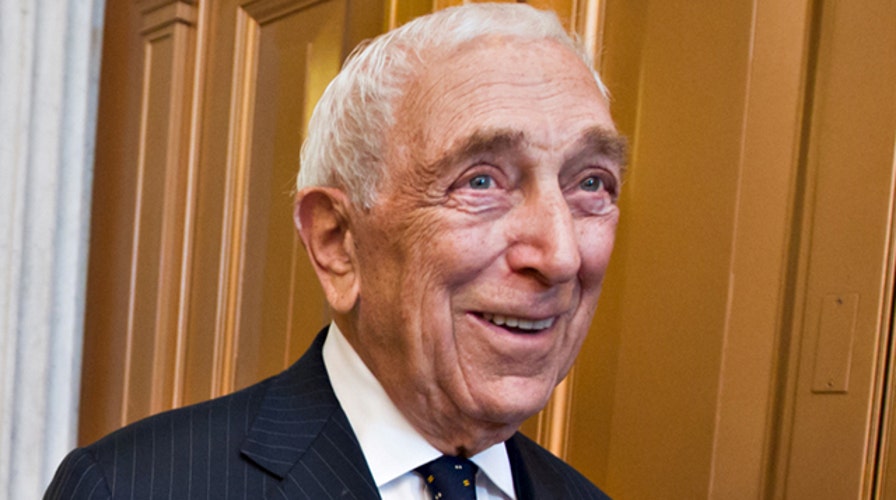Sen. Frank Lautenberg, D-N.J., who cast more votes than any other U.S. senator from New Jersey, died Monday after complications from viral pneumonia.
Lautenberg died at 4:02 a.m., at New York-Presbyterian Hospital/Weill Cornell Medical Center. He was 89 years old.
First elected to the Senate in 1982, Lautenberg lived to be the oldest member of the upper chamber by the end of his tenure and was the last surviving World War II veteran in the Senate. He initially retired from the Senate in 2000, but ultimately returned to Capitol Hill two years later at the age of 78.
Lautenberg was best known for advocating federal restrictions on tobacco use. Most notably, he authored the landmark 1987 law that banned smoking on airplanes. And 21 years later, he led the push to close the Senate "smoking rooms."
He was also a prominent voice for increased gun control even as many fellow Democrats distanced themselves from the issue. He wrote the 1996 law that prohibits domestic abusers from purchasing firearms, and called for closing the so-called gun show loophole to strengthen background checks. In fact, the last votes he cast in the Senate came in April on various gun control amendments.
President Obama saluted Lautenberg's legacy in a statement Monday.
"Michelle and I were deeply saddened to learn of the passing of Senator Frank Lautenberg, a proud New Jerseyan who lived America's promise as a citizen, and fought to keep that promise alive as a senator," Obama said. "First elected to the Senate in 1982, he improved the lives of countless Americans with his commitment to our nation's health and safety, from improving our public transportation to protecting citizens from gun violence to ensuring that members of our military and their families get the care they deserve."
New Jersey Gov. Chris Christie, a Republican, will be tasked with appointing a replacement for Lautenberg, who was not planning to seek re-election in 2014.
The son of Polish and Russian immigrants, Lautenberg's family moved frequently throughout his childhood as his parents struggled to find steady work. Lautenberg was 19 when his father died of cancer, forcing him to work nights and weekends to help support his family until he graduated from high school.
Lautenberg then served in the Army Signal Corps in Europe from 1942 to 1946. Upon his return from the war, he enrolled in Columbia University under the G.I. Bill and earned an economics degree.
In 1952, Lautenberg and two childhood friends founded Automatic Data Processing, the country's first payroll services company. Their start-up ultimately became a multinational corporation and turned the three into millionaires. He served as chairman and CEO until he launched his political career 30 years later.
In 1982, longtime Sen. Harrison Williams, D-N.J., resigned after being convicted of bribery from the Abscam scandal. FBI agents had posed as sheiks in a sting operation bribing local, state and federal officials -- resulting in the convictions of seven members of Congress, including Williams.
Lautenberg edged out eight other candidates in the Democratic primary to replace him. He spent $4 million of his own money in the general election against the heavily favored GOP Rep. Millicent Fenwick and won 51 percent of the vote.
Lautenberg announced his retirement in 2000 after three terms. But two years later, he changed course after New Jersey Democrats convinced him -- just five weeks before the election -- to run again two years later after the incumbent Sen. Robert G. Torricelli, D-N.J., decided not to run amid a campaign finance scandal. "Age doesn't matter" became Lautenberg's mantra.
"Almost as soon as I announced my retirement, I had pangs of regret," Lautenberg told the New York Times. "There's an old Irish saying that describes my philosophy well: 'To rest is to rot.'"
Lautenberg coasted to victory for a fourth Senate term. Upon his return to Congress, however, Democrats declined to restore his seniority accumulated from his previous 18 years in the Senate. Nonetheless, he picked up where he left off on his signature issues.
In the aftermath of the 2011 Tucson shootings that nearly killed Rep. Gabrielle Giffords, D-Ariz., Lautenberg and fellow New Jersey Democratic Sen. Bob Menendez introduced legislation to close background check loopholes and ban the sale of high-capacity magazines.
"The only reason to have 33 bullets loaded in a handgun is to kill a lot of people very quickly," Lautenberg said. "These high-capacity clips simply should not be on the market."
The New Jersey Democrat also introduced a bill to ban online sales of ammunition in light of the 2012 Colorado theater shootings that killed 12 and injured 58 people. But the measure went nowhere especially given the election-year environment.
Lautenberg was a big advocate of AMTRAK as well. The Secaucus Junction Station, where AMTRAK trains bound for New York pass, is named after the late senator.
Lautenberg married his first wife, Lois, in 1956, fathering four children. They ultimately divorced after 31 years of marriage.
In 2004, at age 81, he married his companion Bonnie Englebardt after 16 years of dating. "It takes a long time for us politicians to make up our minds," Lautenberg quipped.
During his fifth term six years later, Lautenberg announced that he had been diagnosed with a treatable form of stomach cancer. He continued to work in the Senate between chemotherapy treatments. Four months later, he declared that he was cancer-free.
He announced his retirement from the Senate in February. At the time, he joked with reporters that he wanted to run for vice president in 2016.
He is survived by his wife, six children and 13 grandchildren.





